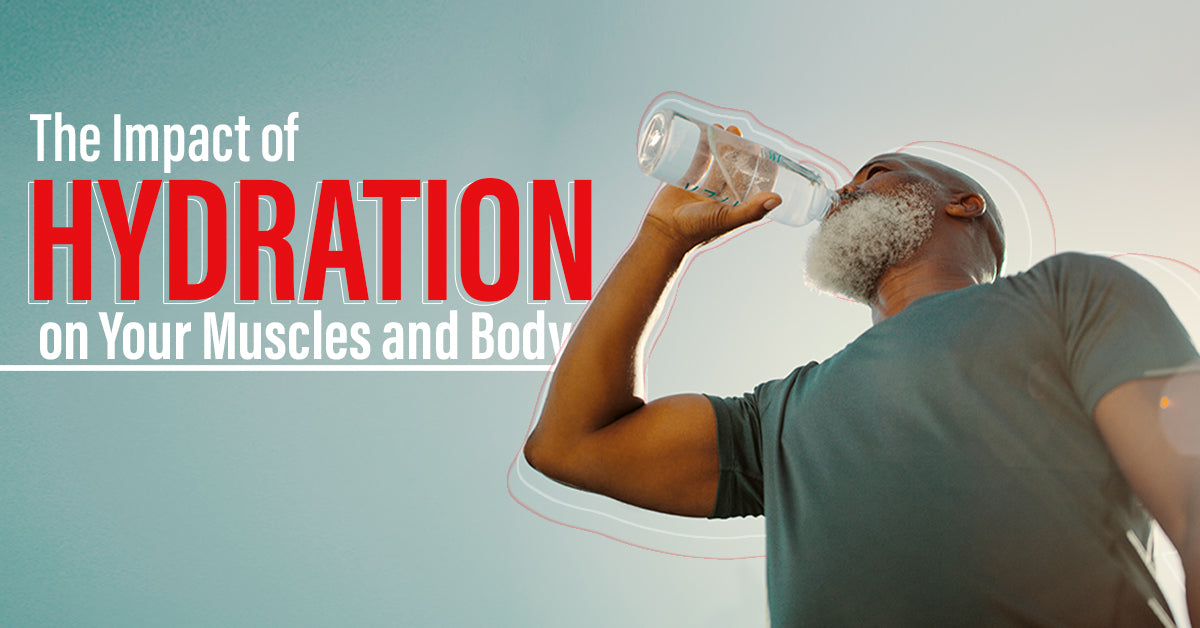The Impact of Hydration on Your Muscles and Body

While we’re generally told to drink eight glasses of water a day in order to remain hydrated, this is often overlooked. So how critical is hydration really?
Mild dehydration is a prevalent ailment among certain groups, such as the elderly and individuals who engage in physical exercise in warmer weather. Hypohydration is a contributing factor in a number of severe medical conditions within the older demographic, and a low regular water intake can be linked to some cancers, diabetes and cardiovascular disease. At moderate levels of hypohydration, there is also evidence of cognitive function problems. Even brief periods of hydration restriction can result in the loss of body mass of 1-2%.
With 55-75% of our body weight being comprised of water, getting enough fluid is crucial to having a well-functioning and healthy body. Hydration impacts everything, including your heart, digestion, brain, muscles and skin. It can lead to improved alertness, more energy and less hunger, as well as faster recovery. It is recommended that you consume between half of an ounce
to an ounce of water per pound of body weight.
In this blog, we discuss the key insights and effects that hydration and dehydration can have on your muscles and body. Keep reading to find out!
Does It Affect Your Kidney Health?
If you’re dehydrated, your kidney function will decline immediately, potentially putting you at risk for kidney stones. Drinking adequate amounts of water allows your kidneys to function correctly and digest the waste products within your body, reducing the toxins inside your body.
What About Blood Pressure?
If you fail to drink enough water, your blood pressure can rise as your body begins to shut down parts of the capillary network, putting additional strain on your major arteries.
This is where the rise in blood pressure comes from when you’re dehydrated. If you’re over-hydrated, your heart rate will decrease. Therefore, it is vital to remain well hydrated to aid in lowering blood pressure.

A Must For Energy and Performance
Your performance can also be negatively impacted in the gym by 20% if you’re dehydrated by just 2-3%. When you’re not properly hydrated, your ability to transfer nutrients, replenish ATP and purge the body of lactic acid is significantly diminished. As a result, your workout can become much more challenging than it should be, causing you to reduce your overall intensity and impacting
your gym results.
Drinking adequate amounts of water is necessary to replace fluids lost in sweat during a workout. Staying hydrated boosts energy, improves movement, recovery and agility, improving physical performance and lowering the risk of injury at the gym.
Does It Help Fat Loss & Diets?
The simplest approach to burning fat is increasing your water consumption. This also increases your satiety levels, which lower your cravings and general appetite.
When you drink more water, your body creates more urine, which is a warm fluid. Because of the energy required, simply drinking more causes you to burn more calories at rest. Combined with the cold water you’re drinking, this compels your body to keep its core temperature constant, which increases thermogenesis.

Muscle Growth & Hydration Goes Hand In Hand
Our muscles are 70 to 80 percent water, which should give you some indication about the importance of hydration, particularly when it comes to muscle growth. The presence of sufficient fluid is primarily responsible for the volumization of muscle or cell swelling.
According to studies, when cells lose water and hence volume, protein production slows and protein breakdown accelerates. A small mistake like forgetting your water bottle during a workout could mean sacrificing muscle gains due to poor performance. Even mild dehydration can have a negative impact on workout performance. Muscle loss can also be prevented through a blend of all 9 amino acids.
Muscle growth can also be slowed down by dehydration. A study performed on weight-trained males concluded that passive dehydration can result in approximately 1.5% decrease of body mass due to water loss, lowering one rep max bench press. When your muscle endurance and power are weakened due to dehydration, you’re less likely to strive for more reps, making your workout less effective.
Helping Your Body’s Recovery & Soreness
Proper hydration is linked to assimilation, nutritional transportation, gut health and joint health.
Water helps regulate body temperature and pH balance by flushing toxins out of the body and transporting nutrients into the cells. Adequate hydration can also alleviate muscle soreness and tension.
If you’re dehydrated, your gut is unable to process food properly, impacting your ability to recuperate and grow, in addition to your ability to perform.
Staying hydrated is a must
At this point, it should be evident that being dehydrated can affect multiple areas of your body and impact your body’s overall ability to grow muscles. This can have a detrimental impact on your overall fitness results.
When it comes to hydration, it doesn’t narrow down to just performing well in the gym; it also comes down to all the problems that can result from dehydration and the overall impact of those on your health and results, so always ensure that you’re drinking adequate amounts of water.
The key to remaining hydrated is consuming at least one gallon of water per day, possibly more, depending on your weight.




